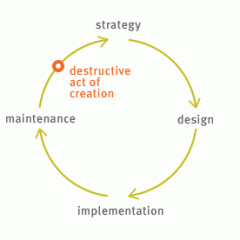

It’s been a news-heavy month. Here are a few more tidbits:
- Yesterday, Tor/Forge announced that it will make all of its ebooks completely free of DRM by early July 2012. This is a momentous and welcome change. Tor/Forge is a genre imprint of Macmillan, one of the Big Six publishers. It’s the first of these publishers to cave to author and cusotmer pressure on DRM. It may have helped that Macmillan is not a publicly traded company. Cory Doctorow believes more Big Six publishers are sure to follow; he’s “had contact with very highly placed execs at two more of the big six publishers.”
- Last month, James Cameron promoted private deep-sea exploration. He’s also partnered with Google’s Larry Page and Eric Schmidt, and Ross Perot Jr., to back private space company Planetary Resources. Immediate plans are to design and build low-cost robotic spacecraft for survey missions. The firm, founded and chaired by Peter Diamondis (creator of the X-Prize Foundation) and Eric Anderson, hopes to then build on this technology and begin mining Near-Earth Asteroids (NEAs) within the next ten years. For an extended explanation of how and why Planetary Resources can succeed, read Phil Plait’s post on the Bad Astronomy blog. We live in exciting times for the exploration and exploitation of space.
[continue reading…]
Help Promote Prometheus Unbound by Sharing this Post


So you want to see Hunger Games when it comes out on Thursday at midnight? It’s not likely that you will get the chance. Tickets in my community have been sold out for weeks. In fact, the first 10 showings of the film are sold out. This disappoints me greatly because it is one of the few teen flicks I’ve really wanted to see.
The whole phenomenon seems set to make the Harry Potter hysteria and the Twilight mania seem like warm-up acts. Ask around among teens, and you will hear this confirmed. This is a true example of mass frenzy. Actually, the whole thing seems like a modern “madness of crowds.” It’s “pandemonium,” as People magazine put it.
Both the plot line and the marketing genius have lessons for our time.
Based on a book by Suzanne Collins that came out in 2008, the film tells the story of an impoverished, totalitarian society in which rebellion among the subjects is punished by the creation of a killing game for mass entertainment. A teenage girl is put in the position to kill or be killed, but she cleverly plots to stand up to the regime by cooperating with her opponent. Together, they win the hearts of the crowd and bring the regime to its knees.
In other words, it is a story about personal freedom against a powerful state, a tale of courage and defiance in the face of power. The reviews by actual readers (versus professional critics) are over the top. It’s Amazon’s No. 1, and it has 4,000 reviews and counting. This is a phenom.
Aside from the plot line, there is something contemporary about the theme of sheer deprivation and survival. It sums up the way young people are looking at the opportunities they are being presented in these times. We aren’t playing hunger games yet, but when an entire generation is pretty sure that it will not fare as well as its parents’ generation, that’s not good. Life seems like the zero-sum game posited in the film.
[continue reading…]
Help Promote Prometheus Unbound by Sharing this Post

As you may have heard, the Department of Justice is looking into opening an antitrust case against the Big 6 publishers and Apple for allegedly colluding to set prices via an agency model which the publishers set the prices for their books in the iBooks store, not Apple. They were then able to put enough pressure on Amazon to coerce it into accepting the agency model as well, which it had previously resisted. This is why you see ebooks being sold on Amazon for $9.99 or more nowadays.
Now, there’s a contingent of publishers and authors who fear change and have grown complacent and dependent on their IP-based, physical distribution model; they tend to see Amazon as an evil corporation out to destroy publishing, bookselling, and writers.
Scott Turow, president of the Authors Guild — does anyone else find the idea of an authors guild disturbing, like modern-day feudalism? some would say the same about the Big 6 publishing houses — recently wrote an open letter speaking out against the antitrust investigation and in defense of the agency model. Quelle surprise! Though it’s ironic to see someone defending big corporations against antitrust investigations who, under normal circumstances (i.e., ones in which his bottom line isn’t directly affected), would probably be in favor of antitrust suits against monopolistic big corporations.
Anyway, Turow types some rather outrageous falsehoods about Amazon. Indie powerhouses Barry Eisler and Joe Konrath1 do a pretty god job of showing how ridiculous Turow’s claims are. Richard Lea summed it up on Twitter with question that makes up the first half of this blogpost title: “Can a bookseller destroy bookselling by selling lots of books?”
I do disagree with Eisler and Konrath on one thing, however, and that is their opposition to the collusion between Apple and the Big 6 publishers. As a libertarian, I don’t have a problem legally speaking with collusion, or price fixing. Without government support, cartels are unsustainable. Of course, believing some practice shouldn’t be illegal doesn’t mean I approve of said practice.
[continue reading…]
Help Promote Prometheus Unbound by Sharing this Post
So it looks like a recently published spy thriller, Assassin of Secrets,1 was largely plagiarized by the “author” from quite a few other novels — some post-Fleming Bond novels and others.
Now, when someone like myself says he is against intellectual “property,” as an illegitimate government grant of monopoly privilege over something that cannot be owned (i.e., ideas), the responses are fairly predictable.
A common one is “Well, then what’s to stop me from copying your novel, changing the name on it, and selling it as my own?”
Well, your customers could sue you for fraud, for one thing. No need for copyright to make that possible.
For another, in the Internet age, you run a very high risk of being found out and ruining your reputation.
In this case, fans of James Bond novels discovered the plagiarism first. As you can imagine, fans can be mighty protective of their favorite books and authors. Try to rip one off and some fan is bound to spot it, and soon they’ll all be royally pissed.
[continue reading…]
Help Promote Prometheus Unbound by Sharing this Post

In an interview with The 99% — Francis Ford Coppola: On Risk, Money, Craft & Collaboration — Coppola offers some very insightful and sensible remarks about creativity, copyright, the role of copying and imitation in the development of art and an artist’s own voice, the business of the arts, and immortality. As Cory Doctorow writes: “It’s always great to learn about seasoned, accomplished artists who refuse the lure of reactionary, knee-jerk get-off-my-lawnery.”
 I once found a little excerpt from Balzac. He speaks about a young writer who stole some of his prose. The thing that almost made me weep, he said, “I was so happy when this young person took from me.” Because that’s what we want. We want you to take from us. We want you, at first, to steal from us, because you can’t steal. You will take what we give you and you will put it in your own voice and that’s how you will find your voice.And that’s how you begin. And then one day someone will steal from you. And Balzac said that in his book: It makes me so happy because it makes me immortal because I know that 200 years from now there will be people doing things that somehow I am part of. So the answer to your question is: Don’t worry about whether it’s appropriate to borrow or to take or do something like someone you admire because that’s only the first step and you have to take the first step…
I once found a little excerpt from Balzac. He speaks about a young writer who stole some of his prose. The thing that almost made me weep, he said, “I was so happy when this young person took from me.” Because that’s what we want. We want you to take from us. We want you, at first, to steal from us, because you can’t steal. You will take what we give you and you will put it in your own voice and that’s how you will find your voice.And that’s how you begin. And then one day someone will steal from you. And Balzac said that in his book: It makes me so happy because it makes me immortal because I know that 200 years from now there will be people doing things that somehow I am part of. So the answer to your question is: Don’t worry about whether it’s appropriate to borrow or to take or do something like someone you admire because that’s only the first step and you have to take the first step…
You have to remember that it’s only a few hundred years, if that much, that artists are working with money. Artists never got money. Artists had a patron, either the leader of the state or the duke of Weimar or somewhere, or the church, the pope. Or they had another job. I have another job. I make films. No one tells me what to do. But I make the money in the wine industry. You work another job and get up at five in the morning and write your script.
This idea of Metallica or some rock n’ roll singer being rich, that’s not necessarily going to happen anymore. Because, as we enter into a new age, maybe art will be free. Maybe the students are right. They should be able to download music and movies. I’m going to be shot for saying this. But who said art has to cost money? And therefore, who says artists have to make money?
(Image: Coppola Francis Ford at Cannes in 2001, Ed Fitzgerald/Wikimedia Commons)
[Via C4SIF and Boing Boing.]
Help Promote Prometheus Unbound by Sharing this Post















